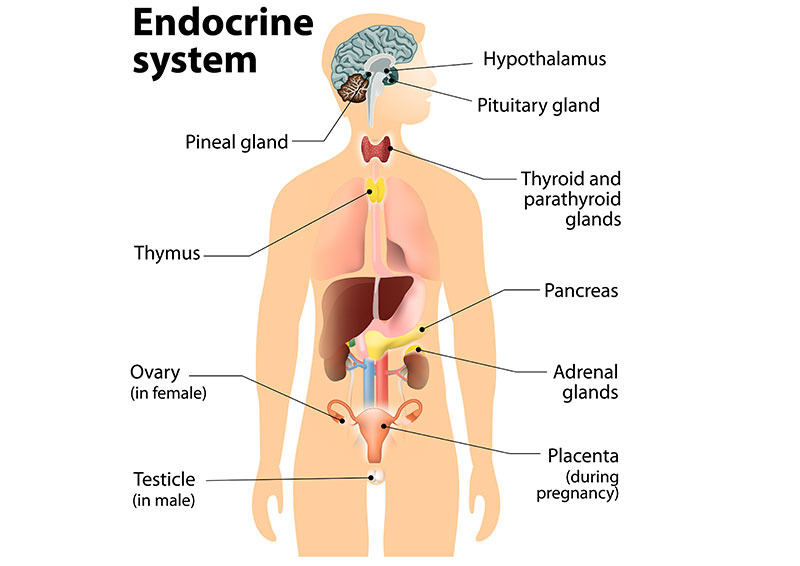Modern diseases
Thanks to the multifunctional equipment and the expert team of the Aesculap hospital that follows the latest world trends in endocrinology, our team will perform complete diagnostics, treatment and, if necessary, surgical intervention.
Hashimoto thyroiditis
An autoimmune disease of the thyroid gland that leads to inflammation
Insulin resistance
Increased level of insulin in the blood and cell resistance to its effect
Diabetes
Insufficient secretion of insulin due to which the blood sugar level increases
Fatty liver
Pathological accumulation of fat in liver cells
Endocrine gland
dysfunction
Endocrinology, as an important branch of internal medicine, deals with disorders and diseases of endocrine glands. The scope of endocrinology includes obesity, metabolic syndrome, eating disorders, prediabetes, diabetes mellitus, thyroid diseases, but also other disorders and diseases: hyperlipoproteinemia (increased cholesterol and triglycerides), non-alcoholic fatty liver disease, elevated uric acid, elevated blood homocysteine levels, diseases of the parathyroid glands, adrenal glands, pituitary gland, sexual dysfunction, infertility (female and male sex hormone disorder), bone density disorder (osteopenia and osteoporosis) and others.

Obesity, pre-metabolic and metabolic syndrome
Obesity, a great concern of today, especially among the younger population, leads to metabolic syndrome and, later, prediabetes and diabetes. By determining BMI (body mass index), waist and hip circumference, as well as other factors of metabolic syndrome (glycemia, triglycerides, HDL-cholesterol, blood pressure), pre-metabolic or metabolic syndrome can be diagnosed. The siMS score is a method that can quantify the metabolic syndrome, and the siMS risk score calculation can indicate the risk for the development of atherosclerotic vascular complications. Based on age, gender, body weight and level of physical activity, daily caloric needs for maintaining basal metabolism can be calculated, which can be adjusted in case of obesity, to obtain an adequate desired monthly weight loss. Individually adjusted Mediterranean seven-day diets verified through decades of clinical endocrinological practice by Prof. Vesna Dimitrijević Srećković can be of great benefit in normalizing body weight and achieving optimal glucoregulation, and preventing numerous chronic disorders and diseases.
Metabolic syndrome and accompanying associated disorders
Insulin resistance, polycystic ovary syndrome (PCOS), infertility in women
In addition to abdominal obesity and increased waist circumference, diagnosing metabolic syndrome requires the presence of two more factors (borderline elevated glycemia, elevated triglycerides, elevated blood pressure, or lower HDL cholesterol). Polycystic ovary syndrome is common in women as part of metabolic syndrome, hyperinsulinism and insulin resistance. Women with PCO syndrome often have glucoregulation disorders, glucose intolerance or diabetes, hypertension, hairiness, facial acne, sex hormone disorders, and absence of ovulation, which can lead to difficulties with childbirth. Correction of body weight, abdominal obesity, hyperinsulinism and insulin resistance reduction through a planned, individual Mediterranean diet, along with physical activity and therapy, can lead to overcoming these disorders and spontaneous conception.
Insulin resistance, abdominal obesity, sexual dysfunction, male infertility
In men with abdominal obesity and metabolic syndrome, testosterone levels are decreased and converted into estradiol in fat tissue. Obese men face impotence, sexual dysfunction, changes in the semen analysis, accompanied by infertility, and sterility. Correction of abdominal obesity with an individually adjusted Mediterranean diet, planned physical activity with medical therapy leads to an increase in testosterone levels, improvement of semen analysis, better potency, and regulation of sexual disorders, all of which leads to planned conception and becoming a parent.
Non-alcoholic fatty liver disease
Non-alcoholic fatty liver disease is an associated metabolic syndrome disorder, detected in obese adolescents, young adults from the age of 20 to 30, and obese adults of both sexes. It is often detected by elevated liver function parameters or by ultrasound. Lack of timely response with hygienic and dietary measures and correction of obesity, body weight and metabolic syndrome factors can lead to fatty liver progressing to fatty hepatitis, cirrhosis, and even hepatocellular carcinoma.
Depression in obese people with metabolic syndrome
Research by Prof. Vesna Dimitrijević Srećković showed depression is related to abdominal obesity in adolescents and young people. Namely, mild depression was found in 32% of respondents and moderate depression in 8% of respondents. Inflammatory factors, cytokines, from fatty abdominal tissue, deplete serotonin (“happy hormone”) levels in the brain, which leads to brain neurotoxicity and the clinical manifestation of depression. The professor’s scientific papers and clinical practice have shown that after reducing abdominal obesity through the Mediterranean diet and physical activity and decreasing inflammation factor measured via C-reactive protein, the clinical picture of patients improves, as documented by the reduction of scores in psychiatric surveys used for diagnosing depression.
Elevated uric acid in people with metabolic syndrome
An elevated uric acid level is often seen in obese people with metabolic syndrome. The scientific papers of Prof. Vesna Dimitrijević Srećković showed that factors associated with the metabolic syndrome are elevated insulin levels (hyperinsulinism), insulin resistance, non-alcoholic fatty liver disease, elevated uric acid levels, protein loss through the kidneys (microalbuminuria) as a sign of endothelial dysfunction, elevated homocysteine values (hyperhomocysteinemia) as a marker of atherosclerosis. The Mediterranean individual diet or an equivalent, Christian fasting, with planned physical activity or walking for one hour per day at a speed of 5 km/h, led to the improvement of these associated factors of metabolic syndrome.
Cancer prevention in obese patients with metabolic syndrome
In recent decades, there has been an increasing frequency of various forms of cancer, which may be the result of genetic and numerous environmental pollution factors. There is a correlation between cancer and body weight, that is, the increasing incidence of obesity all over the world. One of the essential factors that can affect the increasing occurrence of cancer is an improper diet rich in proteins and fats of animal origin, simple carbohydrates and sugars responsible for increased secretion of insulin – hyperinsulinism. Hyperinsulinism is believed to be responsible for carcinogenesis. Reducing body weight through a balanced diet rich in complex carbohydrates and dietary fiber can lead to weight correction, reduce hyperinsulinism and thus prevent cancer. Other significant factors are reduced intake of animal proteins from meat and milk and increased intake of vegetable proteins from legumes and other vegetables and mushrooms.
Prediabetes, Diabetes Mellitus Type 2, and Diabetes Mellitus Type 1
Diabetes mellitus type 2 is one of the most common endocrinological diseases today, and its rate are constantly increasing. It is a consequence of the modern lifestyle and the growing number of external etiological factors, such as obesity, physical inactivity, and stress.
Many patients do not know or are not aware that they suffer from hidden, latent diabetes (prediabetes) or diabetes, which exposes them to a severe risk of early development of numerous complications. That is why every person with abdominal obesity needs to do an oral glucose tolerance test (OGTT) to identify prediabetes (impaired fasting glycemia or glucose intolerance) or type 2 diabetes mellitus.
Measurement of blood glucose, OGTT, all-day glycemic profiles, glycosylated hemoglobin (HbA1C), and insulinemia are some of the important factors for the prevention, monitoring, and treatment of this disease, especially for the prevention of chronic diabetes-related complications on small and large blood vessels.
When it comes to people suffering from diabetes mellitus type 1 who take two or four doses of insulin or use an insulin pump, it is essential to regularly determine daily profiles, measure glycemia before meals or 2 hours after meals, at midnight, or at 03 am. Based on these profiles, postprandial spikes in glycemia or hypoglycemic states can be corrected to achieve optimal glucoregulation.
Thyroid disorders: Hashimoto thyroiditis, Hypothyroidism, Hyperthyroidism, Struma nodosa, Struma polynodosa

In terms of frequency of occurrence, thyroid diseases come second, right behind diabetes. The two most common disorders are hyperthyroidism and hypothyroidism. In recent decades, the occurrence rate of Hashimoto thyroiditis autoimmune disease, which later leads to some of the disorders above, has increased. In the beginning, thyroid disorders perhaps do not cause any pronounced subjective difficulties; the disease can be unrecognized and later manifest with a pronounced clinical picture and complications. That is why screening and regular determination of the thyroid gland’s hormonal status are important to identify antibodies that can indicate the autoimmune disorder Hashimoto thyroiditis.
In addition to these disorders, nodules (nodes) of the thyroid gland may appear, most often clinically manifested as Struma nodosa, when only one nodule is present in the thyroid gland, or Struma polynodosa, with several nodules. It is mandatory to check the tumor markers to rule out possible malignancy and do a fine needle aspiration biopsy and consider potential surgery based on the findings in consultation with the endocrine surgeon.
Diagnosis is made by anamnesis, objective examination, hormone analysis, and color doppler ultrasound examination. Based on the findings, a decision is made on further treatment or follow-up.
Endocrinological disorders and treatment
- Prevention and treatment of obesity – pre-metabolic and metabolic syndrome, reactive hypoglycemia
- Prevention and treatment of prediabetes: impaired fasting glucose (IFG) and impaired glucose tolerance (IGT) and diabetes mellitus type 2
- Treatment of diabetes mellitus type 1
- Prevention and treatment of hyperlipoproteinemia (high cholesterol and triglyceride levels) and atherosclerotic disorders and diseases
- Prevention and treatment of non-alcoholic fatty liver disease (NAFLD)
- Prevention and treatment of obesity, metabolic syndrome, fatty liver in children, adolescents and young people
- Polycystic ovary syndrome (PCOS), insulin resistance, pregnancy planning
- Obesity in men, decline in sexual function and infertility
- Thyroid function disorders: Hashimoto thyroiditis, hypothyroidism, hyperthyroidism, struma nodosa and struma polynodosa
- Prevention and treatment of obesity caused depression
- Prevention and treatment of metabolic disorders associated with eye stroke
- Prevention and treatment of osteopenia and osteoporosis
- Mediterranean diet for the prevention and treatment of obesity, pre-metabolic and metabolic syndrome, diabetes, atherosclerosis, fatty liver, sexual dysfunction, infertility, depression and cancer
- Christian fasting for the prevention and treatment of obesity, pre-metabolic and metabolic syndrome, diabetes, atherosclerosis, fatty liver, sexual dysfunction, infertility, depression and cancer
NUTRITION
One of the most eminent experts in endocrinology, Prof. Vesna Dimitrijević Srećković, MD, Head of the Department for Nutrition and Prevention of Metabolic Disorders, at the Clinic of Endocrinology, Diabetes and Metabolic Diseases, University Clinical Center of Serbia, as an associate of this clinic, will share her decades of experience in nutrition by providing education and individually adjusted healthy diets for the prevention and treatment of chronic diseases.
For more than three decades, in her clinical practice and scientific research work, the professor has been using the Mediterranean type of diet rich in complex carbohydrates from fruits, vegetables and grains, monounsaturated fats from olive oil, omega-3 fatty acids from sea fish, and with a reduced intake of saturated fats of animal origin.
The individually adjusted Mediterranean meals of different caloric intake have shown an excellent effect in the prevention and treatment of numerous disorders and diseases:
- obesity, pre-metabolic and metabolic syndrome,
- prediabetes and diabetes,
- disorder of blood lipids and prevention of atherosclerotic vascular complications,
- non-alcoholic fatty liver disease,
- depression in obese people,
- insulin resistance, polycystic ovary (PCO) syndrome in women,
- sexual dysfunction and male infertility,
- and cancer.
Prof. Vesna Dimitrijević Srećković is the author of the book “Fasting – a way to life – Christian fasting as a method of preventing and treating diabetes, atherosclerosis, and cancer.” As Christian fasting is the equivalent of the Mediterranean diet, it can have the same beneficial effects on all the listed disorders and diseases.
The professor will apply her extensive education and teaching experience by providing individual or small group education and lectures within thematic workshops. She also creates individual seven-day menus with different caloric intakes for different special needs:
- Mediterranean diet for the prevention and treatment of chronic disorders and diseases
- Nutrition for obese children, adolescents, and young people aged 20 to 30
- Nutrition while preparing for pregnancy, for people with PCOS and insulin resistance
- Nutrition during pregnancy and breastfeeding
- Nutrition for obese men with sexual dysfunction and infertility
- Nutrition for thyroid gland, hyperthyroidism and hypothyroidism disorders
- Nutrition for the prevention and treatment of osteopenia and osteoporosis
- Nutrition for cancer patients
- Fasting diet for the prevention of chronic diseases
Internal medicine specialist - consultant at the Aesculap hospital
Prof. dr sci. med. Vesna Dimitrijević Srećković
Specijalista interne medicine / subspecijalista endokrinologije
Specijalista za dijabetes i insulinsku rezistenciju. Redovni profesor na Medicinskom fakultetu Univerziteta u Beogradu.





